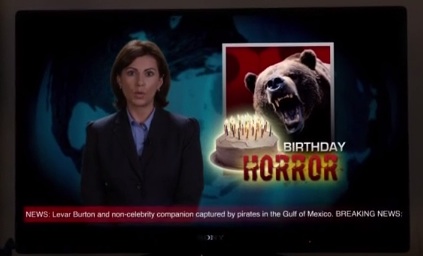Ryan and Mark recap Community, Season 5 Episode 6, “Analysis of Cork Based Networking.” Spoiler alerts for The Wire and Game of Thrones.
Audio Version
[audio:http://www.podtrac.com/pts/redirect.mp3/archive.org/download/oti-recap-community-s05e06/oti-recap-community-s05e06.mp3]→ Download The Community Season 5, Episode 6 Recap
Subscribe for The Latest Recaps
To watch recap videos live or save them for later, follow our Google+ page and subscribe to our YouTube channel.
For audio feeds, you can subscribe to the TV Recap Podcast:
Subscribe on iTunes
Subscribe via RSS
What did you think of these episodes? Sound off in the comments below.
Further Reading
- Max Weber
- Robert Moses
- Here’s the revelation of Troy and Levar Burton’s whereabouts that was tucked away at the end of the episode:

When you guys were discussing people/characters that went into a system wanting to make a difference and ended up ‘corrupted’ by the system, I was really expecting one of you to mention Tyrion. But, then I realized that to really flesh out that argument would require season 4/book spoilers…
That seems to now be reaching a meta-level I’m not sure I’m ready for.
Well actually Garrett’s first appearance is in the first season episode Social Psychology. He’s the first person to tap out of Professor Duncan’s psych lab.
“Go! Fine! Go kill John Lennon again you loser!”
On a less petty note, it’s great to have the old-school Britta back. While I’d love to blame everything on the gas leak, her transition from “The Worst” to an unremarkable air head definitely started under Harmon in season 3, but her plot tonight was nicely reminiscent of her season one attempt to play a prank on Chang, only instead of dumping a corpse out a window she broke Abed’s heart.
At what point in Annie’s chain of deals does her behavior become unacceptable? While Professor Hickey speaks up when it comes to shutting down carpool bulletins, it seems from his behavior earlier in the episode that either he found all of the deals unpalatable, or believed that the chain of deals would inevitably require them to cross some line in order to make it work.
There is (in hypothetical space) a perfectly good version of this story in which the chain of deals resolves itself well. The deals that Annie makes do not start off being unreasonable.
While a proper Weberian bureaucracy would not require such deals to be made, I propose that the dehumanization of the bureaucracy is as destructive as dehumanization tends to be. As evidence of this, the things that the people Annie deals with sort of relate to a hierarchy of needs.
Jerry simply makes them wait for him to finish his meal, and to properly dispose of the plate and napkin. This demonstrates his need, as an organic life-form for food, but not in a rushed manner indicating that it is done only for survival, but with care and attention given to properly disposing of the napkin and plate, displaying an attention to civility which indicates that eating is itself and act with significance beyond giving him the chemical energy required to perform his task within the bureaucracy.
Bob Waite bargains for access to prurient materials, representing the need for sex.
Debra Chambers bargains for a better parking space, representing a need for both convenience and respect.
It is only when she comes to Waldron that the demands become anti-social. He does not merely want the prestige that comes from overseeing the bulletin boards, he wants the power and control over others that comes from managing artificial scarcity.
Rather than letting the chain of deals unravel, this plot could have resolved with Annie talking to the Dean about Waldron, forcing Waldron into earlier retirement, with his replacement quietly giving Debra Chambers the parking space she requested.
That the bulletin board situation is resolved by reliance on anarchy rather than the neo-patrimony she had attempted to use in throughout the episode speaks, I think, to the thesis of the show. I think I would have preferred a neo-patrimonial message, in line with conceiving of Greendale as a well-functioning community, as opposed to a geographic concentration of unrelated people as in anarchy, or a system of organizing behavior that fails to benefit the actors it constrains as a failed bureaucracy.
However, the program is not finished, and we shall see whether how the Save Greendale Committee fares. Most disappointing for me from an ethos standpoint is for Community to remain in a dysfunctional status quo, but the series only recently had its re-pilot, so I remain hopeful.
Did anyone watch the Parks and Rec that came right after Community? I thought it was an interesting contrast with it’s own “chain of deals.” Both shows deal with bureaucracy so I guess it’s not surprising. Leslie and Ann were successful in getting what they wanted through their deals. Does that mean they’re better at being part of the system? They’re more willing to deal with the system pragmatically, rather than idealistically–and I guess in that light it’s interesting that Ann does everything needed to get the deals done. Leslie is more idealistic. Anyway, got off on my own tangent here.
I think we can find a prototype for all the chain-of-deals plotlines in folk stories like “The Old Woman and her Pig.”